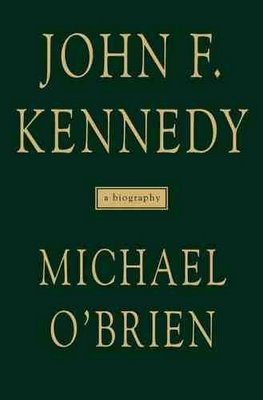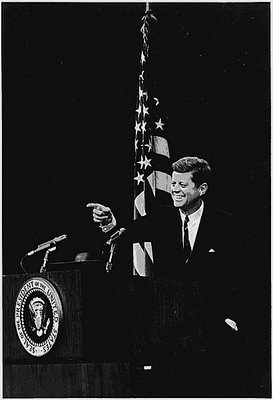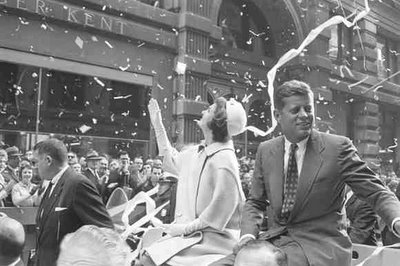
I'm finally nearing the end of Michael O'Brien's fabulous biography of JFK, which I've been reading now for something like four months (not continuously, obviously). Between the blog and other stuff, I end up reading it only while commuting; so yesterday's five hour delay in O'Hare was a godsend for my progress with this book. I've met Dr. O'Brien on several occasions, and have had a few conversations with him about Kennedy, whose story has long captured my attention as it has so much of America and the world.
I think his biography makes for an epic story, and now most of the star players and firsthand sources of the time are gone. So I especially appreciate Dr. O'Brien's pointed attempt to look at all material and to draw the conclusions which the evidence points to, rather than what seems the recent practice of citing only sources which support one's starting conclusion (to coin a 21st Century phrase). One senses that though Dr. O'Brien feels some affection for Kennedy, he has been unflinching in his attempt to uncover the truth, even when the truth does not flatter. And for this reason I think the book will stand the test of time as a great historical resource; it was not written to pursue a fashionable point of view, and will not fall out of favor when that point of view is no longer in vogue.

I'm not generally starstruck, and I have a low tolerance for the cult of celebrity. But we all have our yardsticks, and I know that what constitutes legitimate accomplishment to me is boring and invisible in others, and vice-versa. (Makes the world go round, blah blah blah.) I'm not particularly drawn to JFK's presidency politically, though his interface with the world politically is nicely in sync with my own. But no, in my best People Magazine moment, what I am quite taken with is this snapshot in history, the whole Camelot thing. I suppose it is a celebrity thing to a degree; but to trudge one's way up thru the years, past WW2 and Hitler and Stalin and Churchill and FDR and Eleanor and Truman and Ike, and end up suddenly in the sunlight of JFK and Jackie--to see it in context, the change is remarkable and striking. It makes a fascinating backdrop for the inventory of a personality, a personality who managed in a short time to carve out for himself an absolutely distinct and unique place in human history.
I'm intrigued not so much by the transfer of power from generation to generation per se, but by the confidence of that new generation to take the helm and steer it in a new direction. And this inner-directedness is of course not something new or unique to JFK. One of my most compelling mental images is of Abraham Lincoln (who to my mind is a miracle): he occupies the Presidency reluctantly, but has this bizarre inner calm, an unerring internal compass that allows him to reject the counsel of advisers and lifelong military men to follow his own course, even knowing that his decision will doom thousands of men. And we see this thing in Lincoln again and again. Where does that come from? How does the weight of it not simply crush one?
But back to JFK. Here's a quote from an interview from late 1962, about how his first two years in office differed from what he expected:
"...responsibilities placed on the United States are greater than I imagined them to be, and there are greater limitations upon our ability to bring about a favorable result than I had imagined them to be... There is such a difference between those who advise or speak or legislate, and between the man who must select from the various alternatives proposed and say that this shall be the policy of the United States. It is much easier to make the speeches than it is to finally make the judgments, because unfortunately your advisers are frequently divided. If you take the wrong course, and on occasion I have, the President bears the burden of the responsibility quite rightly. The advisers may move on to new advice." (Emphasis mine.)
JFK had his share of momentous events come across his presidential desk, though nothing perhaps quite as involved and drawn-out as the teetering threat of dissolution thru military conflict of the very country whose care is one's sole charge (though you might argue that the consequences of a mismanaged Cuban Missile Crisis would overreach even the fallout of our Civil War). But there is a clear sense of Kennedy throwing out the parts of the time-honored bureaucratic structure and established customs that did not suit him, and installing in their place something quite fresh and new. He was still pointedly concerned that his methods honor the office and its traditions, but he nevertheless left the office very different than the one he inherited. Again, the confidence of such a young man in so momentous a place.

And to finish thumbing my nose at my own pooh-poohing of the cult of celebrity, he was a fascinating human being; his life story is a fascinating one. He came from a background which is difficult to pigeonhole--old Joe and Rose and their zillion boisterous and brilliant children, living in numerous huge mansions with every material luxury. It's all compelling and enthralling, yet there is a ruthless and at times repulsive aspect to it; and it formed a personality similarly complex and contradictory (as it did too in Bobby, who was similar to JFK in some ways and utterly different in others). He was an extremely wealthy man who was not well-versed in either the ways of focused toil or of money. He seemed often completely out of touch with pragmatic things, yet he cared for the plight of people with whom he could not possibly sympathize, and in a way that seemed to extend well beyond simple political expediency. (It's worth noting that his father, Joseph P. Kennedy, was a ruthless bastard who cared far less for the underprivileged than his son.) He had tendencies toward instant gratification, often oblivious to the costs or pain to others of his course; and yet he had very little vanity and seemed far less self-absorbed than one would expect at first thought. He was a pragmatic politician, a realist not given to a great deal of ideological passion--he once defined himself politically as "an idealist without illusions"--but who nonetheless managed to excite in others great ideological fervor. He made huge strides for civil rights and created the Peace Corps, which lit the fires of idealism beneath the keisters of a whole generation of young people.
Michael O'Brien:
"'Passion' was not a word one used to describe Kennedy's approach to government. He believed that hysterical or overly excited people usually did not have good judgment. To be emotionally committed was to be captive."
(A little off topic, but there's a great Joe Kennedy quote that Michael O'Brien found about Bobby Kennedy and how he differed from JFK. Joe felt that JFK was too forgiving: "You can trample all over him, and the next day he's there for you with loving arms. But Bobby's my boy. When Bobby hates you, you stay hated." There's a hell of a lot of the family in that quote!)
JFK's sexual escapades are the stuff of legend, and I can't help wondering at the connection between this part of him and the brightness with which he lived in so many other areas of his life. I do not invoke some Wagnerian rule that forgives all the pain a person causes others because of some inherent greatness, however defined; but one wonders at the costs of a person being such a mover and shaker, the simple facts about what IS. I know a person, a pilot buddy from my past, who reminds me so much of this part of JFK's makeup. I will have to write someday about all that.
I will wrap this up with a couple interesting quotes from Dr. O'Brien. The book does not focus especially on Kennedy's oratory, though he was a very skilled communicator. I'd like to read something of his collected speeches or writings, though I realize he lived in a time where a politician did not produce most of his or her speeches themselves. In any case, I cannot read these without automatically superimposing this person like a transparency over our current president. I appreciate that Kennedy was a complex and flawed person, flawed as we all are and perhaps on an epic scale. But I think we are lately failing to rank these flaws very well in our public figures. We crucify for personality foibles which are perhaps best left to private consideration, even while we lionize things that maybe will not historically add up to Virtue. And we overlook stuff that ought to really raise red flags.
Writing about JFK's Cabinet choices:
"Kennedy could work congenially with different types of people, but he didn't want to bring on board prospects who were too ideological, too earnest, too emotional, too talkative, or dull. He sought people with qualities like his own, an outlook more practical than theoretical, and more logical than ideological."
"Kennedy told Clifford that he wanted to dismiss political party affiliation as a consideration. A bipartisan administration was congenial for him, since as Walter Lippman pointed out, 'by temperament and instinct and association, he has never been a partisan Democrat of the Roosevelt or the Truman persuasion.'"
JFK on Church / State issues:
"I believe in an America where the separation of church and state is absolute--where no Catholic prelate would tell the President (should he be Catholic) how to act, and no Protestant minister would tell his parishioners for whom to vote--where no church or church school is granted any public funds or political preference--and where no man is denied public office merely because his religion differs from the President who might appoint him or the people who might elect him.
I believe in an America that is officially neither Catholic, Protestant, nor Jewish--where no public official either requests or accepts instructions on public policy from the pope, the National council of Churches, or any other ecclesiastical source--where no religious body seeks to impose its will directly or indirectly upon the general populace or the public acts of its officials--and where religious liberty is so indivisible that an act against one church is treated as an act against all."
And a few general nuggets:
"The men who create power make an indispensable contribution to the nation's greatness, but the men who question power make a contribution just as indispensable, especially when that questioning is disinterested, for they determine whether we use power or power uses us.
"Our national strength matters, but the spirit which informs and controls our strength matters just as much."
"We must accept in our public life what we know is true in our private life--that nothing is achieved without effort and sacrifice."
I do an unwitting disservice to summarize Dr. O'Brien's thousand pages with my little three page blog book report. I urge interested readers to hop over to their local bookstore and pick up a copy. It belongs, with dog-eared pages, on your bookshelf at home. Here's to a great book about a fascinating historical character.
6 comments:
Hey there
Not sure exactly what you're saying about JFK and the sexual side of his nature - care to elaborate?
Mango xxx
JFK had a voracious--pathological, even--sexual appetite, and cheated on virtually every woman he supposedly committed to, sometimes juggling several women at once. His reaction to physical beauty was immediate and chemical, and his staff colluded with him throughout his career to procure outlets for sexual dalliance. I realize that a guy who can't keep from gettin' some is hardly news, but it seems to have been rather extreme in him.
I guess my question is whether his sexual appetite and impulsiveness were in some way tied into his energy and proactive nature. Is there a correlation between his oblivion to the consequences of his conquests (on his wife and children, and to the women themselves, many of whom doubtless thought of themselves as having a greater importance to him than to supply an orgasm in a warm place) and his ability to get things done? Is his sexual confidence related to his political confidence? What 43-year-old (my age) feels confidently ready to govern the United States?
I don't pretend to extraordinary psychological savvy. But these questions come to mind as I read about him.
Funny, I think that paragraph could perfectly describe Clinton too. Guess it makes sense given that Kennedy was Clinton's hero... seemingly in every way.
Yeah, there are many parallels, though I've not read much detail about Bill Clinton. Still, both were sparkling, highly intelligent men with a taste for sexual conquest.
I think I've found my next read. Thanks for the "book report". Growing up in MA, the Kennedys were (and are) quite an ordinary topic. Both the triumphs and the tragedy. I remember being in high school, my dad and I walked up to our city hall and there was Teddy giving a speech and answering questions. I got up real close and he looked me in the eye and I got shivers. Just all that history and magic, quite fascinating.
Interesting Wunelle. I didn't know that about Kennedy - well, I knew he was a cad but I had never heard of the voracious sexual appetite. What you've mentioned is certainly food for thought!
Post a Comment